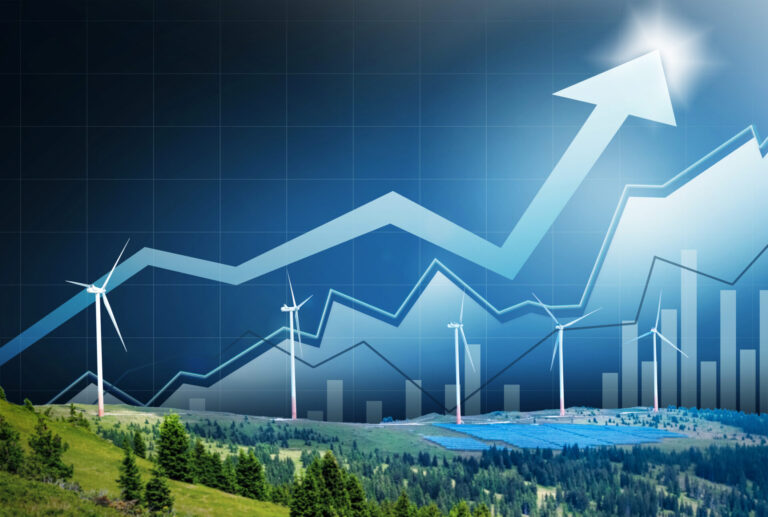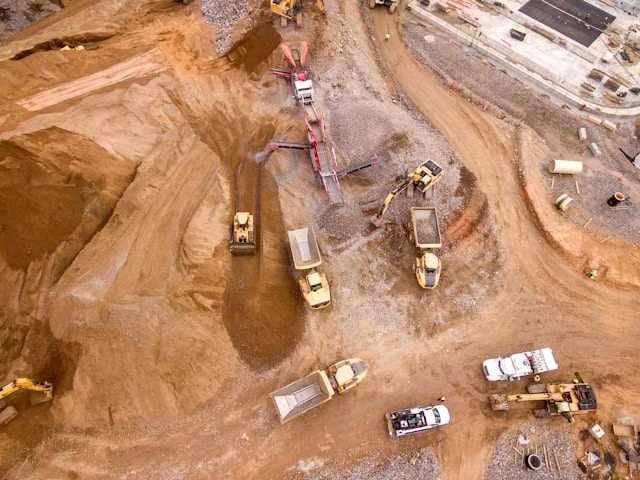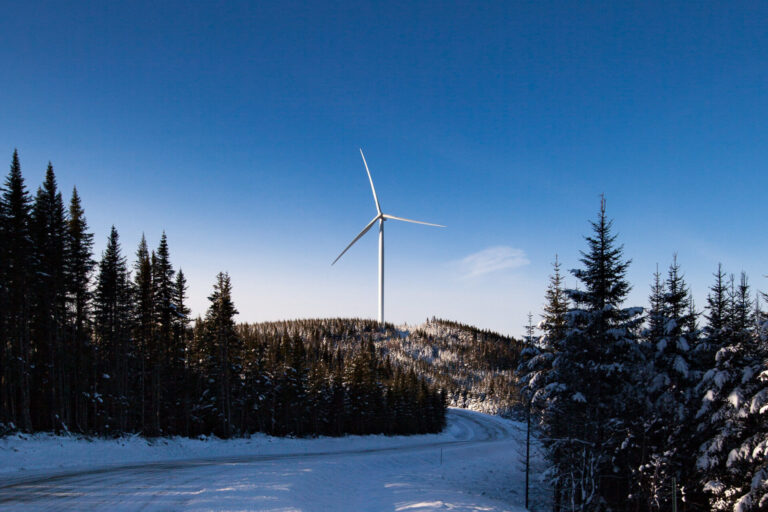Sunday, July 6, 2025
In his virtual presentation today Canadian author Tom Rand said that the coronavirus disease 2019 (COVID-19) gives us an opportunity to rethink economic priorities and insist on stronger commitments for action on climate change.
“The policy is well understood. The capital is there. The corporate engagement exists. There’s an opportunity with COVID for political leadership to step up and really shape this framework,” said Rand in a well attended webcast presented by the MaRS Discovery District in Toronto.
In his new book, The Case for Climate Capitalism: Economic Solutions for a Planet in Crisis, Rand rejects traditional left/right distinctions and proposes a series of pragmatic steps to leverage market forces, existing pools of capital, an effective public sector and existing institutions to re-wire capitalism to engage meaningfully with climate risk.
With the warming climate and a general distrust of Wall Street and Bay Street, Rand provides an informed explanation of how this has opened a new cultural divide among those who otherwise agree we must mitigate climate risk. He argues that anti-market critics target capitalism itself as a root cause of climate change while climate-savvy business leaders believe we can largely continue with business as usual by tinkering around the edges of our economic system.
Rand believes that both sides in this emerging cultural war are ill-equipped to provide solutions to the climate crisis, and each is remarkably naïve in their view of capitalism. “On one hand, we cannot possibly transition off fossil fuels without the financial might and entrepreneurial talent market forces alone can unlock. On the other hand, without radical changes to the way markets operate, capitalism will take us right off the climate cliff,” he says.
Rand’s work focuses on carbon mitigation as an entrepreneur, venture capitalist, author and speaker. He is managing partner of ArcTern Ventures and sits on the board of a number of clean energy companies and organizations. He also developed Planet Traveler, a low-carbon hotel project in downtown Toronto.
In today’s talk, he described some of the key characters involved in influencing the green economy including the “techno-optimists” such as engineer and entrepreneur Elon Musk (bullish on clean tech, renewable energy and electric transportation) and the “environmental prophets” such as economist and banker Mark Carney (seeking to change minds through data about the cost of flood damage and carbon).
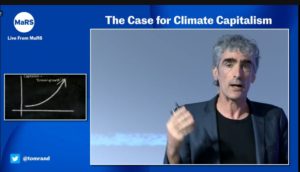
Rand calls for a renewed capitalism that replaces fossil fuels fast enough to mitigate severe climate risk while building a strong economy that survives the century. He warns the business community that they should be on board with sustainable solutions or face the consequences economically and politically.
“When Australia was on fire it was scary. And people are looking to lay blame. My warning to the business community is that we are on the wrong side of history because we are not standing up and acknowledging the risks and doing what needs to be done,” says Rand. “COVID gives us a chance to rethink economic priorities. The public sector is backstopping the private sector right now. If you’re going to take this bale out, you should have stronger commitments on climate. We should be investing public dollars and putting rules in place so that we are rebuilding infrastructure in a more responsible way.”
Rand also addressed some hot topics in Canada. He advises the oil and gas industry as follows: “Stop expanding production. Figure out a way to engineer a soft landing for the highest cost marginal produced on the planet. It’s not climate policy. It’s just economics as EVs come in to play.”
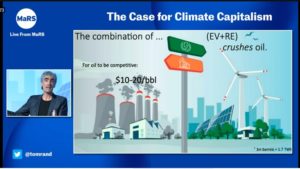
He acknowledged that some oil and gas companies are investing into renewable energy solutions, such as Equinor and Shell, but also said they are investing too little and too slowly.
When discussing current economic turmoil due to the COVID crisis, he provided key suggestions for the green agenda. “The first thing that people are going to worry about is short term immediate economic self interest in the snap back to normality. What we have an opportunity to do though is to think about what kinds of structural economic supports we want to put into play in order to provide a win-win situation moving forward,” explained Rand. “When we think about economic stimulus, we should be supporting low carbon activities, not high carbon activities.”
Rand recommends that retrofitting building stock would have immediate economic benefit, provide jobs in the short term and have long term pay back in terms of environmental and economic resilience. “We could have 10 to 20 years of high economic security from this action alone. There’s lots of low hanging fruit to be picked and then in the long term we can get our most promising clean tech horses into the race. There’s a $2 trillion industry we can go after. The clean tech sector could be bigger than the car sector.”
His first book, Kick the Fossil Fuel Habit (2010), was winner of the 2011 Whitepine Non-Fiction award and his second book, Waking the Frog (2014), became a bestseller. Rand has a bachelor of science in electrical engineering from the University of Waterloo, a masters in philosophy of science from the University of London and LSE, and a masters and PhD in philosophy from the University of Toronto. He is also an Action Canada Fellow, and has been a member of a number of federal and provincial advisory boards.
For further information about Tom Rand and his new book, click here.
To listen to the complete virtual talk, click here.







